Being a Mother Vs Father Mom Vs Dad Alone With Baby
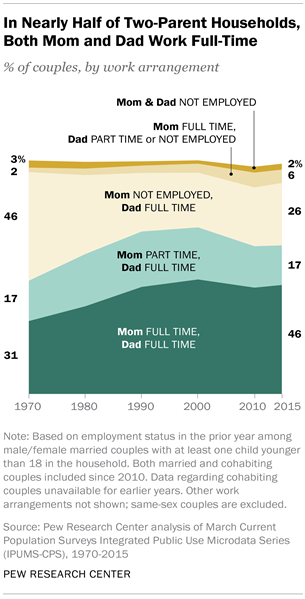 Family life is changing, and so, as well, is the office mothers and fathers play at work and at habitation. As more mothers have entered the U.S. workforce in the past several decades, the share of two-parent households in which both parents piece of work total time now stands at 46%, up from 31% in 1970. At the same fourth dimension, the share with a father who works total time and a mother who doesn't work outside the home has declined considerably; 26% of two-parent households today fit this clarification, compared with 46% in 1970, according to a new Pew Research Center assay of Current Population Survey data.
Family life is changing, and so, as well, is the office mothers and fathers play at work and at habitation. As more mothers have entered the U.S. workforce in the past several decades, the share of two-parent households in which both parents piece of work total time now stands at 46%, up from 31% in 1970. At the same fourth dimension, the share with a father who works total time and a mother who doesn't work outside the home has declined considerably; 26% of two-parent households today fit this clarification, compared with 46% in 1970, according to a new Pew Research Center assay of Current Population Survey data.
In economical terms, families with two full-fourth dimension working parents are meliorate off than other families. The median household income for families with two full-time working parents and at least i child under 18 at dwelling is $102,400, compared with $84,000 for households where the male parent works full time and the mother works part time and $55,000 for households where the father works full fourth dimension and the female parent is non employed. But equally a new Pew Research Center survey shows, balancing piece of work and family poses challenges for parents. In fact, more than than half (56%) of all working parents say this balancing act is difficult. Among working mothers, in particular, 41% report that being a parent has made it harder for them to advance in their career; about half that share of working fathers (20%) say the same.
The survey, conducted Sept. xv-Oct. thirteen, 2015, amid 1,807 U.S. parents with children younger than eighteen, likewise shows that in ii-parent families, parenting and household responsibilities are shared more equally when both the female parent and the male parent work full fourth dimension than when the male parent is employed full time and the mother is employed part time or not employed.i Only even in households where both parents work full time, many say a large share of the day-to-day parenting responsibilities falls to mothers.
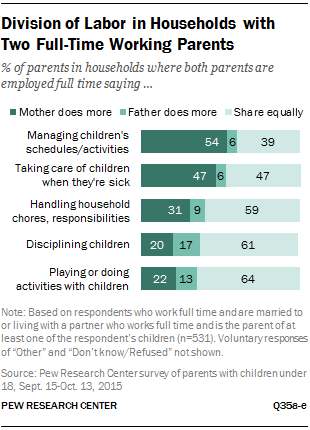 About half (54%) of parents in households where both the female parent and the father piece of work full time say that, in their family, the mother does more when information technology comes to managing the children'southward schedules and activities; 47% also say this is the case when it comes to taking care of the children when they're ill. But most parents in this blazon of household say the mother and the father share tasks nearly equally when it comes to household chores and responsibilities (59%), disciplining (61%) and playing or doing activities with the kids (64%).
About half (54%) of parents in households where both the female parent and the father piece of work full time say that, in their family, the mother does more when information technology comes to managing the children'southward schedules and activities; 47% also say this is the case when it comes to taking care of the children when they're ill. But most parents in this blazon of household say the mother and the father share tasks nearly equally when it comes to household chores and responsibilities (59%), disciplining (61%) and playing or doing activities with the kids (64%).
In households where the father works full time and the mother works part fourth dimension or not at all, the distribution of labor when it comes to childcare and housekeeping is less balanced. These moms accept on more than of the responsibility for parenting tasks and household chores than those who work full time.
Information technology is important to note, however, that in that location's a pregnant gender gap in how mothers and fathers describe their household's distribution of labor. Mothers in ii-parent households, regardless of piece of work condition, are more likely to study that they do more on each of the items tested in the survey than fathers are to say their spouse or partner does more than. For their part, fathers are generally more than probable than mothers to say that these responsibilities are shared about as. For instance, 64% of mothers in two-parent households say that they exercise more than their spouse or partner when it comes to managing their children's schedule and activities. And while many fathers (53%) concede that the mom in their household does more of this than they practise, dads are much more than probable than moms to say this responsibility is shared equally (41% vs. 31% of moms).
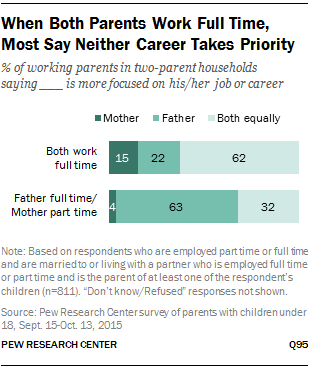 While mothers and fathers offer somewhat different views of the segmentation of labor in their household, at that place is full general agreement virtually who in their family unit is more job- or career-focused. For example, in two-parent households where the mother and father work total time, 62% say both are equally focused on work, while about ane-in-five (22%) say the father is more than focused and 15% say the female parent is. Differences in the responses to this question betwixt mothers and fathers in this type of household are pocket-sized.
While mothers and fathers offer somewhat different views of the segmentation of labor in their household, at that place is full general agreement virtually who in their family unit is more job- or career-focused. For example, in two-parent households where the mother and father work total time, 62% say both are equally focused on work, while about ane-in-five (22%) say the father is more than focused and 15% say the female parent is. Differences in the responses to this question betwixt mothers and fathers in this type of household are pocket-sized.
In households where the begetter works total time and the female parent works part time, a 63% majority, including 71% of fathers and 57% of mothers, say that, in their family, the father is more focused on his job or career than the mother; about a tertiary (32%) say both are every bit focused and 4% say the mother is more focused.
Across all two-parent households where both parents are employed at least part time, 59% say the father earns more the mother, 17% say the mother earns more, and 23% say they earn about the same. Perhaps not surprisingly, 83% of parents in families where the father is employed full time and the mother is employed part time say the father earns more than, while three% say the mother does and 14% say they earn about the same. All the same, even in families where both parents piece of work total fourth dimension, half say the male parent is the peak earner, while 22% say the female parent is and 26% say they earn near the same amount.
Hit a Work-Family Balance Is Hard, Most Parents Say
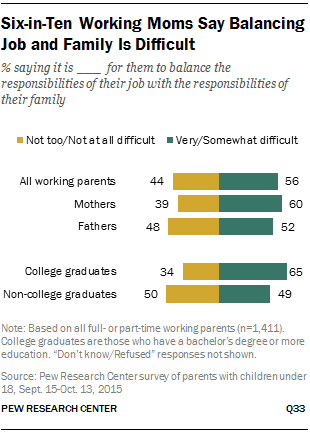 For many working parents, balancing their jobs and their family obligations tin exist a challenge. Among all working parents with children under age 18, more than than half (56%) say it is difficult for them to balance the responsibilities of their job with the responsibilities of their family, with xiv% saying this is very difficult and 42% say it'due south somewhat hard.
For many working parents, balancing their jobs and their family obligations tin exist a challenge. Among all working parents with children under age 18, more than than half (56%) say it is difficult for them to balance the responsibilities of their job with the responsibilities of their family, with xiv% saying this is very difficult and 42% say it'due south somewhat hard.
Working mothers (threescore%) are somewhat more probable than fathers (52%) to say it's hard for them to balance work and family, and this is especially the example for mothers who work full time. In fact, one-in-5 full-time working moms say balancing the two is very hard for them, compared with 12% of dads who work full fourth dimension and 11% of moms who work role time.2
There is a significant educational activity gap in attitudes most balancing work and family unit, with higher-educated mothers and fathers much more likely than those without a college degree to say it is difficult for them to balance the responsibilities of their job and their family. Among working mothers with a college or post-graduate degree, lxx% say it is difficult for them to balance work and family unit life; 52% of mothers without a college degree say the aforementioned. Similarly, amidst working fathers, 61% of higher graduates say this is difficult for them, compared with 47% of non-college graduates. These differences hold even when controlling for the fact that college-educated parents are more than likely to piece of work full time.
In that location is also a racial gap in these attitudes. White parents are more than likely than those who are not-white to say it is difficult for them to balance work and family.3 About six-in-10 (57%) white working fathers say this is the case, compared with 44% of non-white fathers. Amid working moms, 65% of those who are white say it is hard for them to residual the responsibilities of their job with the responsibilities of their family unit; about half (52%) of non-white working mothers say the same.
 For working parents, attitudes toward balancing their job and their family life are highly correlated with their experiences as parents. For example, parents who say it is difficult for them to strike the right rest between piece of work and family are far less likely than parents who don't to report that being a parent is enjoyable all of the time (36% vs. 50%). And past a narrower just significant margin, working parents who find it difficult to remainder work and family are also less inclined than those who don't to say existence a parent is rewarding all of the time (48% vs. 57%).
For working parents, attitudes toward balancing their job and their family life are highly correlated with their experiences as parents. For example, parents who say it is difficult for them to strike the right rest between piece of work and family are far less likely than parents who don't to report that being a parent is enjoyable all of the time (36% vs. 50%). And past a narrower just significant margin, working parents who find it difficult to remainder work and family are also less inclined than those who don't to say existence a parent is rewarding all of the time (48% vs. 57%).
Overall, relatively few working parents (9%) say parenting is stressful for them all of the time. Just a pregnant share say that parenting is stressful all or almost of the fourth dimension, and that sentiment is much more mutual among parents who say they have difficulty balancing work and family unit life (32% compared with 15% of those who say achieving a work-life balance is not difficult for them). In improver, four-in-ten (39%) of those who say it is hard for them to remainder their responsibilities at work and at dwelling house observe being a parent tiring at least well-nigh of the time; of those who say information technology'south non difficult for them to strike a balance, 23% say existence a parent is tiring at to the lowest degree near of the fourth dimension.
Few Say Being a Working Parent Interferes with Career Advancement
While balancing work and family unit life tin exist difficult for many working parents, the survey suggests that being a parent doesn't necessarily interfere with career advancement. When asked if beingness a parent has fabricated information technology harder or easier to accelerate in their job or career or if it has had no bear on, a majority (59%) of working parents say it has not fabricated a difference. Iii-in-x say being a parent has made it harder for them to advance at work, and one-in-x say being a parent has made it easier.
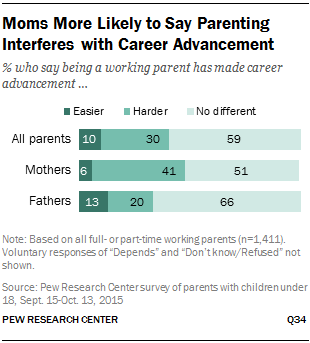 These overall numbers mask the disproportionate impact women say being a working parent has on their careers. Mothers are twice as probable equally fathers to say beingness a working parent has made information technology harder for them to advance in their task or career. About four-in-ten working mothers (41%) say this, compared with two-in-ten working fathers. And mothers who work office time are merely as probable every bit those who work full time to say beingness a working mother has made it harder for them to move ahead in their task.
These overall numbers mask the disproportionate impact women say being a working parent has on their careers. Mothers are twice as probable equally fathers to say beingness a working parent has made information technology harder for them to advance in their task or career. About four-in-ten working mothers (41%) say this, compared with two-in-ten working fathers. And mothers who work office time are merely as probable every bit those who work full time to say beingness a working mother has made it harder for them to move ahead in their task.
For working mothers who accept a spouse or partner who is more focused on his job than they are, existence a working parent may have more of an impact on career advancement. About half (48%) of working mothers who say their spouse or partner is more focused on his work as well say beingness a parent has made it harder for them to get ahead at work. By comparing, 30% of mothers who say they and their spouse or partner are equally focused on their careers say being a working parent has made it harder for them to advance in their job.
Four-in-Ten Full-Time Working Moms Always Feel Rushed
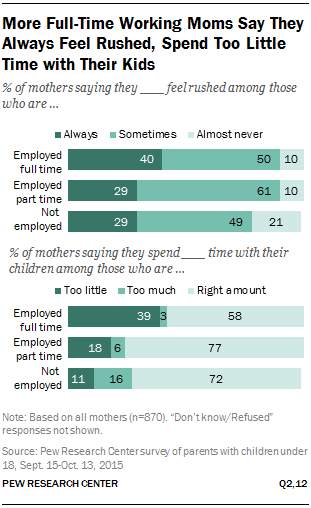 Virtually parents, including at least viii-in-10 mothers (86%) and fathers (81%), say they feel rushed at least sometimes. But for many mothers who piece of work full time, feeling rushed is an almost abiding reality. In fact, iv-in-10 full-time working moms say they always feel rushed, even to do the things they have to practise; an boosted 50% say they sometimes feel rushed and only ten% never feel rushed.
Virtually parents, including at least viii-in-10 mothers (86%) and fathers (81%), say they feel rushed at least sometimes. But for many mothers who piece of work full time, feeling rushed is an almost abiding reality. In fact, iv-in-10 full-time working moms say they always feel rushed, even to do the things they have to practise; an boosted 50% say they sometimes feel rushed and only ten% never feel rushed.
In comparison, about three-in-x mothers who are employed role fourth dimension or not employed say they e'er feel rushed (29% in each group). But while 61% of moms who are employed office time say they sometimes feel rushed, fewer of those who are not employed (49%) experience similarly. In turn, mothers who practise not work outside the dwelling are near twice as likely as those who do to say they never feel rushed.
Total-fourth dimension working moms are also more likely than mothers who are employed part time or not employed to say they spend too little time with their children and to say they don't have enough time away from their children to get together with friends or pursue hobbies or interests. And among those who are married or cohabiting, mothers who work full time are more likely than other moms to say they spend as well little time with their partners.
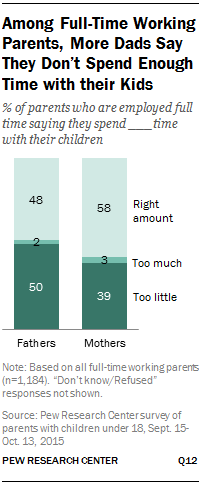 About iv-in-10 (39%) mothers who are employed full time say they spend too little time with their kids, while 58% think they spend the right amount of time and merely 3% say they spend too much time with their kids. At least seven-in-10 mothers who are employed role time (77%) or not employed (72%) say they spend about the right amount of time with their children, while eighteen% and xi%, respectively, say they spend too petty time. Near 1-in-six (xvi%) mothers who do not work exterior the home say they spend too much time with their kids; fewer (half-dozen%) of those who piece of work office time say the aforementioned.
About iv-in-10 (39%) mothers who are employed full time say they spend too little time with their kids, while 58% think they spend the right amount of time and merely 3% say they spend too much time with their kids. At least seven-in-10 mothers who are employed role time (77%) or not employed (72%) say they spend about the right amount of time with their children, while eighteen% and xi%, respectively, say they spend too petty time. Near 1-in-six (xvi%) mothers who do not work exterior the home say they spend too much time with their kids; fewer (half-dozen%) of those who piece of work office time say the aforementioned.
Amongst those who are married or cohabiting, 44% of mothers who work full time say they spend too petty time with their partners, compared with 27% of moms who are employed role fourth dimension and 34% of moms who are non employed. At least half in each group say they spend the right amount of fourth dimension with their partners, while few say they spend too much fourth dimension.
Fathers who work full time are no more probable than those who work function time or are not employed to say they always feel rushed (29% and 27%, respectively).4 But fathers who are employed full time are somewhat more than likely than other dads—and more likely than full-fourth dimension working moms—to say they spend too little time with their kids. Half of full-fourth dimension working dads say this, compared with 41% of dads who are employed part time or not employed and 39% of full-time working moms.
When information technology comes to leisure time, about one-half or more of all parents—whether they are employed full time, function time, or not employed—say there'south not enough of it. Total-time working mothers are somewhat more likely than other mothers to say this is the case; about six-in-x (59%) say they don't have enough time away from their children to get together with friends or to pursue hobbies and other interests, compared with about half of mothers who are employed office time (48%) or are non employed (47%). Among fathers, the same shares of those who work full fourth dimension and those who piece of work function fourth dimension or are not employed say they don't have enough leisure time abroad from their children (53% each).
Who Does More?
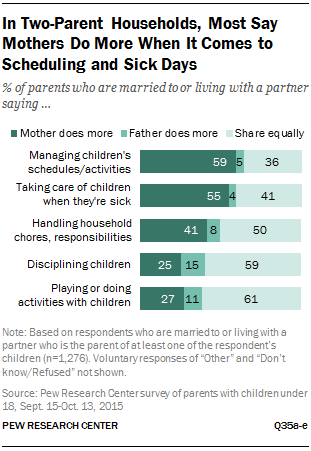 Most parents who are married or living with a partner with whom they share at to the lowest degree one child say that, in their household, the mother does more than the father when it comes to certain tasks related to their children. In particular, roughly six-in-x (59%) say the mother plays a larger role in managing their children's schedules and activities, while just 5% say the father does more and 36% say the parents share this responsibility as.
Most parents who are married or living with a partner with whom they share at to the lowest degree one child say that, in their household, the mother does more than the father when it comes to certain tasks related to their children. In particular, roughly six-in-x (59%) say the mother plays a larger role in managing their children's schedules and activities, while just 5% say the father does more and 36% say the parents share this responsibility as.
Similarly, when it comes to taking intendance of ill children, 55% of married or cohabiting parents say the mother does more than than the father; simply iv% say the father does more, and 41% say both parents share this equally.
Mothers besides tend to take on more household chores and responsibilities; 41% of married or cohabiting parents say this is the instance in their households, compared with just 8% who say the male parent does more than. Half say they and their partner share household chores and responsibilities almost equally.
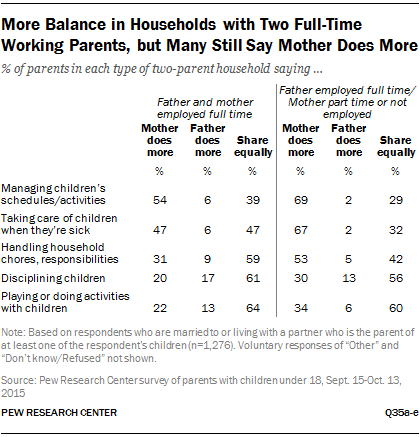 The division of labor between mothers and fathers is more than even when information technology comes to disciplining and playing or doing activities with children. A quarter of married or cohabiting parents say the mother plays more of a disciplinarian role in their families, while 15% say the father does, and 59% say both share this role every bit. Almost as many (27%) say the female parent does more when it comes to playing or doing activities with their children; 11% say the father does more, and 61% say both play or practice activities with their children about equally.
The division of labor between mothers and fathers is more than even when information technology comes to disciplining and playing or doing activities with children. A quarter of married or cohabiting parents say the mother plays more of a disciplinarian role in their families, while 15% say the father does, and 59% say both share this role every bit. Almost as many (27%) say the female parent does more when it comes to playing or doing activities with their children; 11% say the father does more, and 61% say both play or practice activities with their children about equally.
In households where both parents work total time, mothers and fathers tend to share some responsibilities more equally. For instance, about six-in-ten (59%) parents in these households say this is the case when it comes to household chores and responsibilities. Still, nigh three-in-x (31%) say the mother takes on more of this, while ix% say the male parent does. And while 47% of parents in ii-parent households where both the mother and the male parent work full time say they and their partner play about an equal function when it comes to taking care of sick children, the same share says the female parent does this more than the father. Merely 6% in this type of household say the father does more.
Parents in households where both parents piece of work full fourth dimension written report that mothers are doing more than than fathers when information technology comes to managing their children'due south schedules and activities. Some 54% say the mother does more than in this surface area, while 6% say the father does and 39% say parents share this responsibleness near equally.
Perhaps not surprisingly, in households where the male parent is employed full time and the female parent is either not employed or is employed role time, childcare responsibilities usually fall to the mother.
For case, about ii-thirds of parents in these households say the mother does more than when it comes to managing the children's schedules and activities (69%) and caring for them when they're sick (67%).
Perceptions of Partition of Labor Vary by Gender
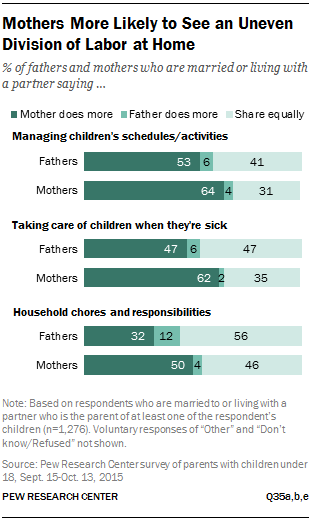 Mothers and fathers in ii-parent households differ in their perceptions of how they carve up sure responsibilities. The gap is peculiarly pronounced when it comes to household chores and responsibilities. One-half of mothers in ii-parent households say they do more their partners in this area, compared with 32% of fathers who say their wives or partners do more than. Fathers, for their part, are more likely to say they and their partners share household chores and responsibilities about as: More than half (56%) say this is the case, while 46% of mothers hold.
Mothers and fathers in ii-parent households differ in their perceptions of how they carve up sure responsibilities. The gap is peculiarly pronounced when it comes to household chores and responsibilities. One-half of mothers in ii-parent households say they do more their partners in this area, compared with 32% of fathers who say their wives or partners do more than. Fathers, for their part, are more likely to say they and their partners share household chores and responsibilities about as: More than half (56%) say this is the case, while 46% of mothers hold.
Similarly, while well-nigh six-in-ten mothers say they practise more than their partners when it comes to managing their children's schedules and activities (64%) and taking intendance of their children when they're ill (62%), fewer fathers agree that, in their households, mothers do more in each of these areas (53% and 47%, respectively). In these areas, likewise, fathers are more likely than mothers to say they and their partners share responsibilities nearly equally.
To varying degrees, these gender differences in perceptions of who does more than are evident in two-parent households where both parents work full time too equally in households where the father is employed total fourth dimension and the mother is employed part time or is not employed. Where there are differences, mothers are more probable to say they do more fathers are to say that their partner does more, while fathers tend to say responsibilities are shared about equally.
Focusing on Career and Raising a Family
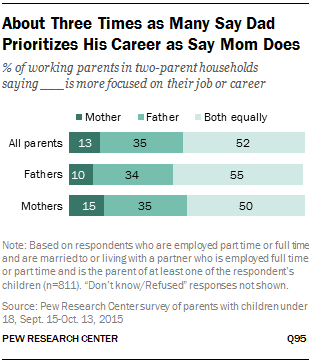 In households where both the female parent and father are working at least part fourth dimension, about half (52%) say that both are equally focused on their task or career. Where there is an imbalance, parents are most three times as likely to say that the father in the household is more than focused on his career than the mother is focused on hers (35% vs. 13%).
In households where both the female parent and father are working at least part fourth dimension, about half (52%) say that both are equally focused on their task or career. Where there is an imbalance, parents are most three times as likely to say that the father in the household is more than focused on his career than the mother is focused on hers (35% vs. 13%).
Mothers and fathers in these households mostly concur about who is more focused on piece of work. For example, ten% of fathers say their spouse or partner is more focused on work and 34% say they are more than focused. Among mothers, 15% say they are more focused on work, while 35% say their spouse or partner is.
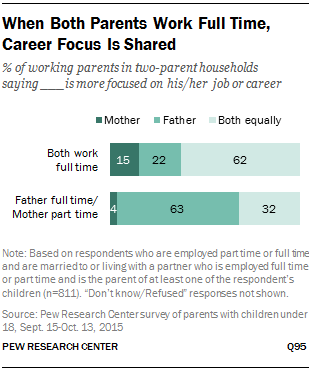 Among full-fourth dimension working parents with a spouse or partner who also works full time, most (62%) report that mom and dad are as focused on their careers. Only 15% of parents in these households say that the mother is more focused on her chore, and 22% say the father is more focused on his task.
Among full-fourth dimension working parents with a spouse or partner who also works full time, most (62%) report that mom and dad are as focused on their careers. Only 15% of parents in these households say that the mother is more focused on her chore, and 22% say the father is more focused on his task.
The situation is much different in households where the begetter works full time and the female parent works part fourth dimension. A majority of parents (63%) in these households (71% of fathers and 57% of mothers) say the father is more focused on piece of work than the female parent is, while 32% say they are every bit focused and just 4% say the mother is more focused than the father.
Amidst fathers in two-parent households, there is a significant racial gap in terms of how focused they say they are on their job compared with their spouse or partner. White fathers (39%) are much more than likely than non-white fathers (19%) to say they are more focused on their career than their spouse or partner is. Among not-white fathers, a solid majority (69%) say they and their spouse or partner are equally focused on their jobs, compared with half of white fathers.
Who Earns More in Two-Parent Households?
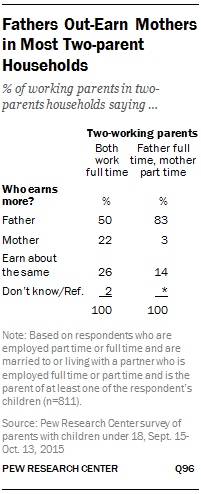 While half of working parents say they and their spouses or partners are equally focused on their careers, the same is not truthful when information technology comes to compensation. Only 26% of parents in households where both parents work full time say they and their spouses or partners earn nearly the same amount of coin. Half say the begetter makes more, and 22% say the mother makes more.
While half of working parents say they and their spouses or partners are equally focused on their careers, the same is not truthful when information technology comes to compensation. Only 26% of parents in households where both parents work full time say they and their spouses or partners earn nearly the same amount of coin. Half say the begetter makes more, and 22% say the mother makes more.
These findings are comparable to regime data that show in 52% of married couples in which the female parent and father worked full time, the father earned more in 2014. In 24% of these households the mother earned more, and in the remaining 23% the mother and male parent earned most the same amount. Fathers earned more in the vast majority of households (86%) where the father worked full time and the mother worked part time.v
In the Pew Enquiry survey, among mothers in two-parent households, those who work full time (24%) are more than likely than those who work part fourth dimension (4%) to report that they earn more than than their husband or partner. Even so, 44% of full-time working mothers in 2-parent households say their spouse or partner earns more than they do; 32% say they earn about the same corporeality. Among function-time working moms, 78% say their hubby or partner earns more than they practise.
Similarly, working mothers with a college teaching are more likely than those who have not finished college to say that they out-earn their spouse or partner (23% vs. 8%). Nearly one-half (51%) of college-educated working moms say that their spouse or partner earns more than them, and 25% say that they earn about the same amount.
In households where parents study that they are equally focused on their careers, half (50%) say that the father earns more than the mother. Some eighteen% say that the mother earns more in those households, and 30% say they earn about the same amount. In households where the father is more focused on his career than the female parent, 84% say the male parent earns more, 5% say the mother earns more and x% say they earn near the same corporeality. In families where the mom is more than focused on her career than the dad is on his, a plurality (46%) say the female parent earns more; three-in-ten in these households say the father earns more, and 24% say they earn about the same amount.
wasingerclany1963.blogspot.com
Source: https://www.pewresearch.org/social-trends/2015/11/04/raising-kids-and-running-a-household-how-working-parents-share-the-load/
0 Response to "Being a Mother Vs Father Mom Vs Dad Alone With Baby"
Enregistrer un commentaire